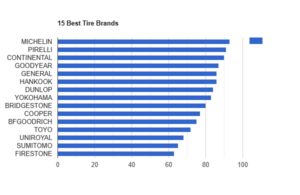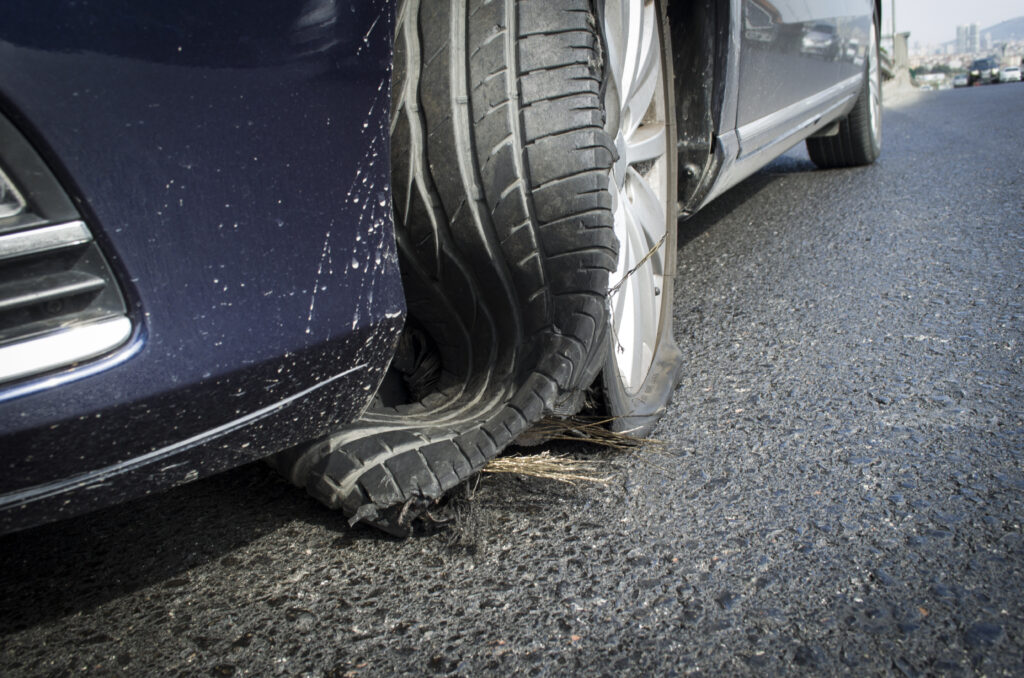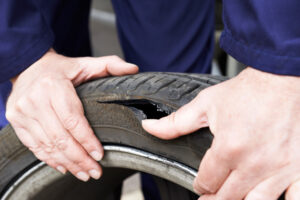What Is The Most Common Cause Of Tire Blowouts?
What is the most common cause of tire blowouts? Underinflation of the tires. Improper inflation of a tire can lead to overheating and increased risk of failure. Underinflated tires come into greater contact with the road, causing excessive flexing and heat buildup. This could jeopardize the tire’s structural integrity, potentially causing a blowout.
Overinflation
Going beyond the tire’s maximum load capacity can cause added strain, raising the chances of a blowout. An overinflated tire blowout occurs when the tire generates excessive heat due to increased friction with the road surface. The added heat leads to component separation in the Tire Belt, creating increased forces in specific areas and resulting in failure due to explosive decompression.
Aging and wear
Tires degrade with time, and old tires are more likely to fail if not replaced. The internal structure weakens due to regular use. Most tire manufacturers advise replacing tires every six years. As tires age, they can no longer safely support weight at high speeds, increasing the risk of rupture and bursting. Excessive wear and tear may cause issues like balding tread, uneven tread wear, fabric separations, and embedded foreign matter.
How To Avoid Tire Blowouts
Ensuring tire safety is crucial to the protection of you and your passengers while driving. A blowout happens when one or more tires suddenly lose air pressure, resulting in significant underinflation or deflation. Tire blowouts cause a significant number of fatal car crashes in the United States . Regularly maintaining proper tire inflation pressure can greatly reduce the risk of a blowout and ensure optimal vehicle performance.
A Mopar Road Hazard Tire And Wheel Protection plan provides coverage for all four tires and wheels that are damaged due to a road hazard condition for both factory and aftermarket tires and wheels. Any damages caused by chuckholes, potholes, metal objects, blown tire rubber, curbs, glass and unforeseen objects is covered!
Ensure that you monitor the tread on your tires and regularly rotate them every 3 months to maintain even wear. Regularly perform an alignment check every three months as well. Promptly repair any camber misalignment using camber shims to enhance handling and enhance road stability. Excessive tire wear patterns can result in turbulence and increased heat production, which may lead to a tire blowout. Furthermore, if a tire has been driven on with uneven treads, it is probable that the sidewalls have suffered damage and may potentially fail in the future.
You also want to avoid hitting potholes and curbs while driving. Hitting this can cause tears and bulges in your tire’s sidewall, which lead to blowouts. Driving cautiously and reducing your speed on rough and uneven roads minimizes the stress on your tires.
If you do happen to have a tire blowout, you’ll want to pull over safely so you can Change Your Tire or call an assistance provider such as AAA.
Check Your Tire Pressure
To ensure vehicle safety and prevent tire blowouts, regularly check tire pressure. Do this monthly or more frequently in high heat conditions. Consult your vehicle’s manual for the recommended pressure for your specific make and model, referred to as the Vehicle Placard Pressure. If the tire pressure is below this value, inflate the tire with an air compressor. Ensure the use of precise gauges for checking and adjusting tire pressures. Under-inflated tires can amplify rolling resistance resulting in decreased fuel economy. Over-inflation leads to brake instability and handling issues due to stiff sidewalls.
To check your tire pressure, consult your owner’s manual for the recommended PSI level. Park on a flat surface and ensure that the tires are not hot from driving. Before pressing the Tire Pressure Gauge to it, remove the valve cap and store it in a safe place. You will hear a hiss of air, and then the gauge will show the pressure, which should match the recommended PSI. Adjust the inflation or deflation as necessary.
What Does The PSI On Vehicle Tires Mean?
PSI stands for “pounds per square inch,” and it is a unit of pressure used to measure the inflation pressure of vehicle tires. The PSI rating on vehicle tires represents the recommended or maximum air pressure that the tire should have when it is properly inflated. The ideal tire pressure recommended by the vehicle manufacturer can usually be found in the owner’s manual or on a sticker located on the driver’s side door. It is important to follow this recommended PSI to ensure optimal performance, fuel efficiency, and tire longevity.
How To Air up Your Tires
Airing up your tires is a straightforward process, and you can do it yourself using a few simple tools. To start, you’ll need an air compressor, you can find one at almost any gas station.
- Take off the valve caps. Make sure to set them somewhere secure so you don’t misplace or lose them.
- Connect the compressor to the valve stem. Make sure that the hose is properly attached, you should hear air being transferred to your tires.
- Inflate the tires. Turn on the air compressor and wait for the gauge to reach the correct PSI level. Depending on your vehicle and tire type, it may take several minutes., Be sure to not fill your tire with too much air.
- Let out extra air. If you happen to overinflate your tires, release the air by depressing the valve.
- Put on your valve caps. Make sure that your valve caps are on securely, not having your caps is okay but without them your tires can deteriorate faster. Be sure to replace them soon if you’ve lost them.

By regularly checking and inflating your tires to the recommended pressure, you’ll ensure safer driving, better fuel efficiency, and longer tire life. If you find yourself on the side of the road somewhere with a flat tire, having a Mopar Extended Warranty ensures that you’re covered with AAA roadside assistance.






